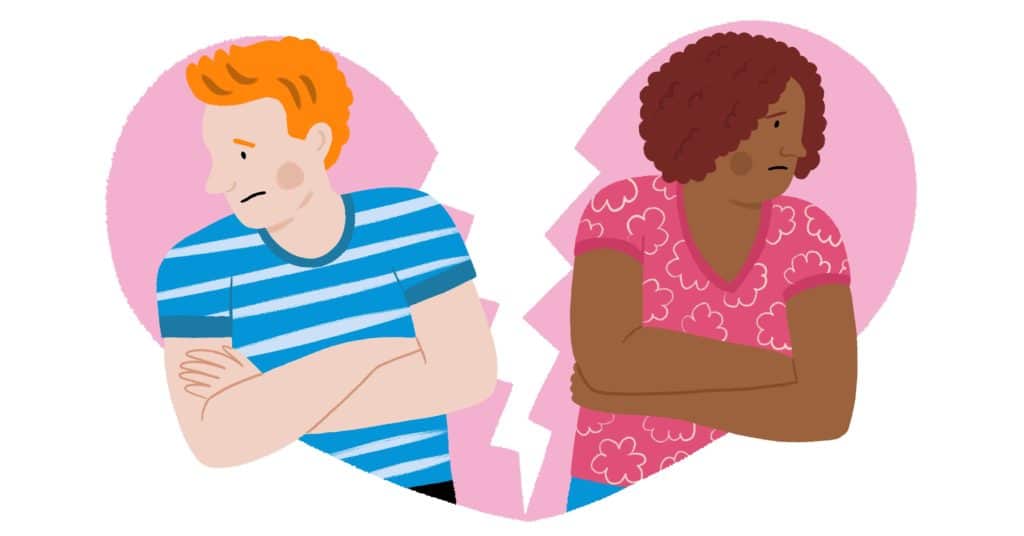
By Mary Fetzer
Marriage can be difficult in the best of circumstances. Adding in challenges, such as having a partner or child with ADHD, can exacerbate that difficulty. Sadly, ADHD can be a factor in divorce. Experts have thoughts on why this may be so. They also have tips on how to navigate the family dynamic when ADHD is involved.
Here are some of their thoughts, and tips:
When Your Child Has ADHD
Studies have shown that parents of a child with ADHD are more likely to divorce than parents of children without ADHD. A 2014 study in Denmark found that 10 years after the birth of the child, parents of children diagnosed with ADHD had a 75% higher probability of having dissolved their relationship. In 2008, researchers at the University of Buffalo showed that 22.7% of parents of children with ADHD had divorced by the time the child was 8 years old, compared to 12.6% of parents without ADHD.
“Children with ADHD often struggle with behaviors at home or school, and this can be stressful for parents,” says Danielle Dellaquila, a licensed master social worker who works with people with ADHD. “Parents might disagree or be unaware of how to help their child best manage their ADHD, which can cause conflict between the couple.”
Dellaquila explains that children with ADHD require a lot of focus and attention, and this can lead their parents to neglect the attention they give to one another.
“It can happen in families with children with any disability and is never the child’s fault,” Dellaquila emphasizes. “Instead, the couple needs to recognize how the child’s ADHD impacts their family and their relationship and work to determine how to cope best.”
Marital discord can be prevented by gathering and accepting the facts. Obtaining a proper diagnosis from a qualified clinician is a good first step, according to Dellaquila. Doing so can help the parents understand the impacts of the diagnosis and provide strategies for the family.
In addition to supporting the child with ADHD, it’s important to support each other as parents. Dellaquila says it is common for one parent to take on most of the responsibility for the child with ADHD, leaving them to feel isolated and abandoned.
At the same time, the less-involved parent may feel neglected by their spouse. For this reason, Dellaquila encourages parents of a child with ADHD to set aside time for themselves as a couple.
“It can be easy to let quality time with your partner slip, but it is imperative to continue to make that time for yourselves, no matter how stressful life gets,” she says. “A strong partnership and good communication benefit not only each member of the couple but also the rest of the family.”
A solid parental partnership can help provide a sense of teamwork and avoid conflict in supporting a child with ADHD.
When You or Your Spouse Has ADHD
Relationships are twice as likely to fail when one of the partners has ADHD than those in which the partners don’t have it, according to a study published in 2021 by Ohio University and Appalachian State University. Behavior analyst and mental health professional Ryan Bolling says there are a couple of reasons why this is so.
“Individuals with ADHD often have difficulty with executive functioning skills like planning, organization and time management,” she says. “These difficulties can lead to conflict in a relationship as the partner without ADHD feels like they are constantly picking up the slack.”
Studies have shown that the spouses of adults with ADHD reported that their partner’s symptoms make it harder for them to manage their household and raise kids.
Bolling says that impulsivity may be another contributing factor. It can lead a person with ADHD to say or do things without first considering the consequences, which can certainly lead to problems in the relationship.
Surprisingly, however, the burden felt by the partner who does not have ADHD is not the only factor. A 2022 New York Times article that included interviews with people with ADHD found that adults with the condition say they’re more dissatisfied with their marriages than even their partners.
But Bolling encourages couples to take specific steps to prevent these issues from causing friction between them.
“First, it is important to be aware of the symptoms of ADHD and how they can impact a relationship,” she says. “This will help the individual who does not have ADHD to be more understanding and patient with their partner when they are struggling.”
Open communication is key, as well. Bolling advises couples to discuss — in a calm and respectful way — their frustration, such as one partner feeling overwhelmed or thinking the other isn’t pulling their weight.
“Finally, consider seeking professional help,” Bolling says. “A therapist or counselor can help both partners develop tools and strategies for managing ADHD symptoms. With understanding and effort, most couples can make things work.”
Sources:
Science News: Couples With Children With ADHD At Risk Of Higher Divorce Rates, Shorter Marriages
The New York Times: A.D.H.D. Can Strain Relationships. Here’s How Couples Cope




